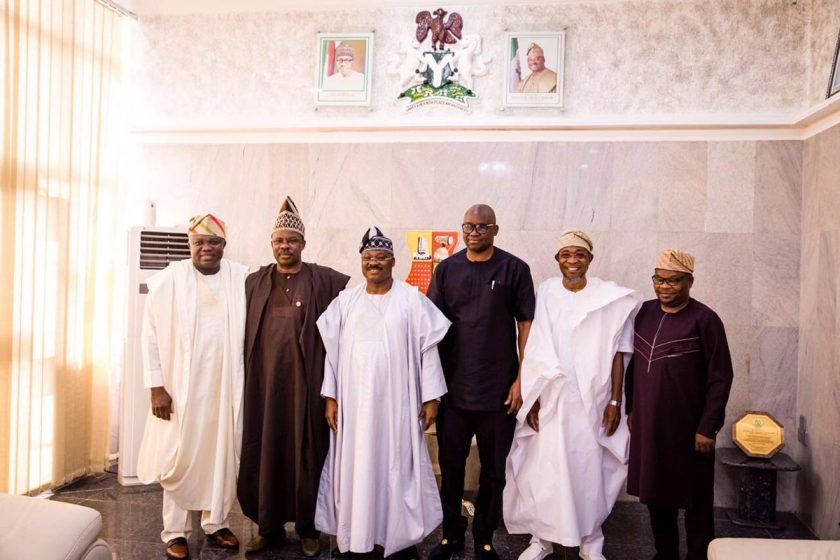First, an ode to politicians. Being a politician itself is a major nightmare. Because politics accommodates the cheat, the egoist and the unscrupulous, even those driven by noble objective are often tarred with the same brush. But politics is not all about intrigue. It is also about service and without the versatility and brinkmanship of those driven by noble objective to meet rising expectations of those without hope, society will descend to in to chaos. Those who chose to spend their time, talent and resources to serve society therefore deserve our gratitude. It must also be added that politics is even a more hazardous profession especially in our own multi-ethnic society where as Governor Ajimobi put it during the governors’ parley initiated by the Development Agenda For Western Nigeria, (DAWN), ‘We were coerced by the British overlords in the evergreen magical marriage of inconvenience called amalgamation of 1914 with nationalities and their different worldviews, different ideologies, different cultures, different political beliefs, soldered into one component by the British colonial masters’.
This heterogeneity fortunately was acknowledged by the majority of our founding fathers except Zik who said our ‘cultural differences had been exaggerated by accident of colonial rule’. That was why they settled for federalism with each group mapping out a socio-economic blueprint informed by the innate ingenuity of their forebears. To build on the ‘cultural welfarism’ which defines the world-view of the Yoruba, the starting point for Awo and his group was the result of a commissioned survey of Eastern Region which showed that the East had between 1934 when Zik returned to Nigeria and 1951, caught up and outstripped the Yoruba that was once ahead in area of education, with more secondary schools, more hospital bed spaces per thousand and more mileage of tarred roads. This informed the AG manifesto ‘of free education, free health and full employment’.
Sadly, 64 years and 17 years into the fourth republic, after a group of Yoruba youths first exploited our uniqueness to build a secured future for their people, Ajimobi and his current governors of the Yoruba states are just coming to the realization that “the key to leveraging our uniqueness is the regional approach to dealing with our afflictions, overcoming our difficulties, as well as creating sustainable pathway to progress together”. Unfortunately this belated acknowledgement is coming after so much harm has been done that not a few including Dr. Olapade Agoro, the chairman, National Action Council (NAC), who says ‘the parley portrayed ambient culture of self-deceit, and insincerity for deviating from western region self- sufficiency’, have much faith in the governors’ new initiative.
The reason for cynicism is obvious. Our governors with exception of few since the fourth republic have behaved like locusts eating and sharing the proceeds of efforts of a more visionary generation. Many believe the poor quality of leadership they give is but a reflection of lack of preparation for leadership. Unlike those Obasanjo (he once boasted of achieving what his better educated Yoruba compatriots could not achieve) picked from the streets and made governors, Awolowo paid his dues before becoming the Premier of the West. He was surrounded by men with quality education and of solid character such as Adekunle Ajasin, Ladoke Akintola, Remi Fani-Kayode, Bode Thomas, Rotimi Williams, Olaniwun Ajayi, Ayo Adebanjo, Abraham Adesanya, Oduola Osuntokun, etc. They were assisted by a think-tank consisted equally of men of solid character and of excellent academic achievements such Professors Hezekiah Oluwasanmi, Samuel Aluko, Banji Akintoye, Oluwole Awokoya etc.
These young visionaries set up the Western Regional Marketing Board in 1954 which developed the cash crop industry in the west and together with other regional boards “became the dominant economic system in the Nigerian economy controlling 63% of the foreign exchange earned by the country in 1961”.
They established the National Bank. They later bought Nabani Estates, a fully owned subsidiary of the bank and turned it to WEMABOD which became the biggest property builders and estate managers in the country. They went on to set up the National Investment and Properties Company Limited (NIPC). They also set up the Odu’a Investment Company Limited, which became Nigeria’s biggest conglomerate in the post-independent years with Ikeja Hotels Ltd, Vegetable Oil Nig. Ltd. and the Great Nigeria Insurance Company as some of its subsidiaries. They did not only establish industries, they empowered entrepreneurs irrespective of political leanings.
Tragically between 1985 when Babangida started his liberalization programme and 1987 when Obasanjo completed the sharing of Nigeria’s $100b worth of investment at a giveaway price of about $1.6b, many of the investments built through the blood and sweat of Western Region cocoa farmers and taxpayers were sold. Between 1999 and 2007, under Obasanjo’s new privatization policy similar to his “Commodity Boards Decree 1977” which destroyed the Western Region’s economy, Yoruba governors presided over the sale of some of the companies. Equally taking the advantage of the Obasanjo’s government monetisation policy with which the political class confiscated our national patrimony at the federal level, some of the Yoruba governors descended on choice properties built by their predecessors. In the dying days of Adebayo Alao-Akala as governor of Oyo State, the Alaafin of Oyo reminded him that such malady was unacceptable within the Yoruba culture.
In total disregard for the entrenched Yoruba culture of check and balance which had existed long before the advent of participatory democratic system, there emerged a new generation of Yoruba governors who behave like sole administrators or sometimes as outlaws, locking up Houses of Assembly and chasing lawmakers out of town, governors who publicly fought over who was to buy government banks they did not establish, entangled in the Ikoyi choice government property sale scandals or hunted by EFCC for acquiring choice properties with stolen funds. Yet this is a region where neither Oduola Osuntokun (later died a school teacher) who as a minister, supervised the building of the Bodija Estate , nor Awo, Akintola or Rotimi Williams have mansions within the estate or within the Ikeja GRA also built by their government .
Bola Tinubu, in spite of his personal political travails remains our political leader. As our revered Pa Adeyinka Adebayo reminded him not too long ago, “fate has put him in a prime position to determine to a large extent the direction the Yoruba people will go”. He must now deploy his political genius to mobilise those who have quietly and selflessly served the cause of the Yoruba race such as Wale Oshun, General Alani Akinrinade without leaving out ex-President Obasanjo (the “ebora of Owu) since in Yoruba cosmology, we can achieve nothing without first pouring libation to Esu the god of confusion. Tinubu was able to manage Obasanjo before the last election; he can do this again for the peace and progress of our people.
And the time for action is now. The Yoruba, of the three dominant groups in the country, as Pa Adebayo reminded Tinubu, remains the weakest link. While our governors groom area boys and political thugs, the West’s economy has been taken over by the north and the east through Dangote and the Igbos; while our governors build airports, governor’s mansions and flyovers, industries are springing up in the East. While we once harnessed the energy of our youths through farm settlements and became self -sufficient in food production, we today depend on the north to feed ourselves. It is time to implement the DAWN agenda painstakingly put together by Yoruba professionals and intellectuals.
Source: The Nation
Social Media Links
Facebook – www.facebook.com/osundotlife
Instagram – www.instagram.com/osundotlife
Twitter – www.twitter/osundotlife
Kindly share this story | All rights reserved. This material, and other digital content on this website, may not be reproduced, published, broadcast, rewritten or redistributed in whole or in part without prior express written permission from OSUNDOTLIFE.
Contact: editor@osun.life
WhatsApp: 📲 +2348092333666

